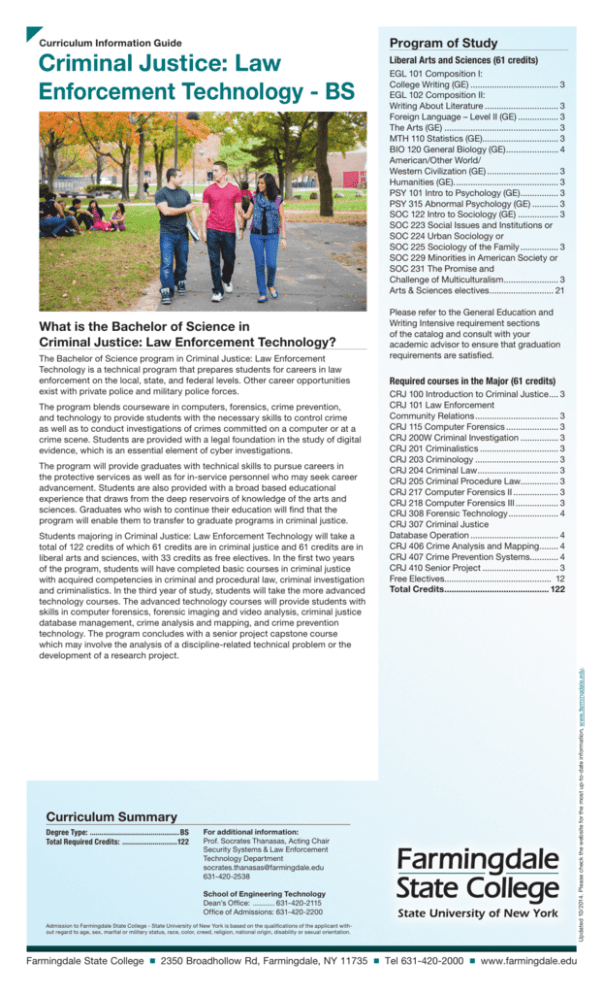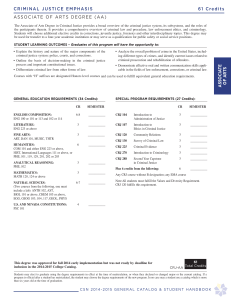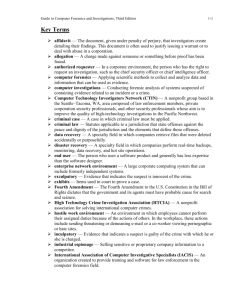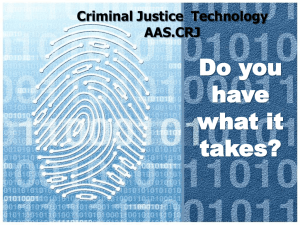Criminal Justice: Law Enforcement Technology - BS
advertisement

Program of Study Curriculum Information Guide Criminal Justice: Law Enforcement Technology - BS Liberal Arts and Sciences (61 credits) EGL 101 Composition I: College Writing (GE)...................................... 3 EGL 102 Composition II: Writing About Literature................................ 3 Foreign Language – Level II (GE).................. 3 The Arts (GE)................................................. 3 MTH 110 Statistics (GE)................................. 3 BIO 120 General Biology (GE)....................... 4 American/Other World/ Western Civilization (GE)............................... 3 Humanities (GE)............................................. 3 PSY 101 Intro to Psychology (GE)................. 3 PSY 315 Abnormal Psychology (GE)............ 3 SOC 122 Intro to Sociology (GE).................. 3 SOC 223 Social Issues and Institutions or SOC 224 Urban Sociology or SOC 225 Sociology of the Family................. 3 SOC 229 Minorities in American Society or SOC 231 The Promise and Challenge of Multiculturalism........................ 3 Arts & Sciences electives............................ 21 Please refer to the General Education and Writing Intensive requirement sections of the catalog and consult with your academic advisor to ensure that graduation requirements are satisfied. What is the Bachelor of Science in Criminal Justice: Law Enforcement Technology? The Bachelor of Science program in Criminal Justice: Law Enforcement Technology is a technical program that prepares students for careers in law enforcement on the local, state, and federal levels. Other career opportunities exist with private police and military police forces. Required courses in the Major (61 credits) CRJ 100 Introduction to Criminal Justice..... 3 CRJ 101 Law Enforcement Community Relations.................................... 3 CRJ 115 Computer Forensics....................... 3 CRJ 200W Criminal Investigation................. 3 CRJ 201 Criminalistics.................................. 3 CRJ 203 Criminology.................................... 3 CRJ 204 Criminal Law................................... 3 CRJ 205 Criminal Procedure Law................ 3 CRJ 217 Computer Forensics II.................... 3 CRJ 218 Computer Forensics III................... 3 CRJ 308 Forensic Technology...................... 4 CRJ 307 Criminal Justice Database Operation...................................... 4 CRJ 406 Crime Analysis and Mapping......... 4 CRJ 407 Crime Prevention Systems............. 4 CRJ 410 Senior Project................................. 3 Free Electives............................................. 12 Total Credits............................................. 122 The program blends courseware in computers, forensics, crime prevention, and technology to provide students with the necessary skills to control crime as well as to conduct investigations of crimes committed on a computer or at a crime scene. Students are provided with a legal foundation in the study of digital evidence, which is an essential element of cyber investigations. The program will provide graduates with technical skills to pursue careers in the protective services as well as for in-service personnel who may seek career advancement. Students are also provided with a broad based educational experience that draws from the deep reservoirs of knowledge of the arts and sciences. Graduates who wish to continue their education will find that the program will enable them to transfer to graduate programs in criminal justice. Updated 10/2014. Please check the website for the most up-to-date information, www.farmingdale.edu. Students majoring in Criminal Justice: Law Enforcement Technology will take a total of 122 credits of which 61 credits are in criminal justice and 61 credits are in liberal arts and sciences, with 33 credits as free electives. In the first two years of the program, students will have completed basic courses in criminal justice with acquired competencies in criminal and procedural law, criminal investigation and criminalistics. In the third year of study, students will take the more advanced technology courses. The advanced technology courses will provide students with skills in computer forensics, forensic imaging and video analysis, criminal justice database management, crime analysis and mapping, and crime prevention technology. The program concludes with a senior project capstone course which may involve the analysis of a discipline-related technical problem or the development of a research project. Curriculum Summary Degree Type: ................................................ BS Total Required Credits: ..............................122 For additional information: Prof. Socrates Thanasas, Acting Chair Security Systems & Law Enforcement Technology Department socrates.thanasas@farmingdale.edu 631-420-2538 School of Engineering Technology Dean’s Office: ............ 631-420-2115 Office of Admissions: .631-420-2200 Admission to Farmingdale State College - State University of New York is based on the qualifications of the applicant without regard to age, sex, marital or military status, race, color, creed, religion, national origin, disability or sexual orientation. Farmingdale State College n 2350 Broadhollow Rd, Farmingdale, NY 11735 n Tel 631-420-2000 n www.farmingdale.edu CRJ 100 Introduction to Criminal Justice Philosophical and historical background of policing throughout the free world; special emphasis is placed on the heritage of British and American policing, the governmental role of law enforcement in society; administration of American justice at all levels of government. The role of technology in law enforcement and crime prevention; history, modes and impact. (3,0) Credits: 3 CRJ 101 Law Enforcement and Community Relations Emphasis will be placed on the numerous and complex factors involved in the areas of human relations as they affect law enforcement. An examination of prejudices, myths, and discrimination, how to control them, and their impact in law enforcement. The use of information management tools for classifying cases with respect to issues of bias. (3,0) Credits: 3 CRJ 200W Criminal Investigation (Writing Intensive) Introduction to criminal investigation, technical methods used at the crime scene; development of clues, identification of suspects, criminal investigation procedures including the theory of an investigation, conduct at crime scenes; collection and preservation of physical evidence, analysis of the elements that constitute all crimes. This is a writing-intensive course. Prerequisite(s): EGL 101 with a C or higher (3,0) Credits: 3 CRJ 201 Criminalistics The role of the Crime Laboratory in the law enforcement organization; scope of a criminalistic operation; organizational orientation of the criminalistics laboratory. Reconstruction of the crime scene through computer animation methods. (3,0) Credits: 3 CRJ 203 Criminology This course introduces anthropological, biological and economical, ecological, philosophical, psychological, psychiatric and sociological theories of criminal behavior as well as research evidence on the basic patterns of crime and crime trends. Computer-based data analysis of index crimes selected from the Uniform Crime Reports compiled by the Federal Bureau of Investigation and National Crime Victimization Survey. (3,0) Credits: 3 CRJ 204 Criminal Law Elements and proof of frequent concern in law enforcement, with reference to principal rules of criminal liability. Importance of criminal law at the enforcement levels is considered from crime prevention to courtroom appearance. Particular emphasis will be placed on the New York State Penal Law. Case analysis method is employed to study case precedents. Computer software for rapid information retrieval will be introduced. (3,0) Credits: 3 CRJ 205 Criminal Procedure Law Rules of evidence of particular importance at the operational level in law enforcement with emphasis on criminal procedure in areas such as arrest, force, and search and seizure. Particular emphasis will be placed on the New York State Criminal Procedure Law. The use of case tracking tools within prosecution and court units and systems; the use of case outcome analytical techniques to determine trends in practice and effectiveness. (3,0) Credits: 3 CRJ 308 Forensic Technology The course will introduce the student to photographic and video equipment and methods that are used for crime scene documentation and police surveillance operations, including forensic imaging analysis. The course will include a study of camera design and operation, lens selection and functions, role of light and illumination technologies, digital image editing software, and a review of the chain of custody procedures in recording and archiving images for courtroom presentation. Prerequisite(s): CRJ 201 Corequisite(s): CRJ 308L (3,2) Credits: 4 CRJ 307 Criminal Justice Data Base Operations The course introduces students to the meaning and structure of criminal justice data, the design of and security for criminal, legal and classified databases, the management of competing information security and confidentiality concerns, and the rights to access criminal justice records on the part of the public, corporate interests and the media. The course examines criminal justice data collection throughout the legal lifecycle (complaint, arrest, prosecution, court, corrections, probation and parole); understanding all through the prism of authenticity, value, timeliness, accountability, integration and prevention. Prerequisite(s): CRJ 115 Corequisite(s): CRJ 307L (3,2) Credits: 4 CRJ 406 Criminal Analysis and Mapping Students will learn how to analysis and apply sampled data distributions to crime patterns. Digital tools will allow students to identify trends and patterns in order to determine police service allocations based on collected data The science and foundation principles of geographical information systems design and operation will be reviewed. Homeland Security implications as well as publicly available geospatial information will also be covered as specific applicaions for mapping techniques. Prerequisite(s): CRJ 307 Corequisite(s): CRJ 406L (3,2) Credits: 4 CRJ 407 Crime Prevention Systems This course will introduce the student to the theory and practice of crime prevention and examine topics such as the relationship of the built environment to crime, designing out crime, threat assessment, target hardening, and the like. The course will also focus on residential and commercial crime prevention systems. In addition, an analysis of false alarms from the perspective of the environment, end-user errors, and equipment malfunctions will be conducted. The course concludes with a review of police studies that have examined the nature and extent of the false alarm problem as well as the laws that regulate the use of crime prevention systems by public and private agencies. Prerequisite(s): CRJ 406 Corequisite(s): CRJ 407L (3,2) Credits: 4 CRJ 410 Senior Project Independent study of a Security Systems or related area of interest to both the student and a faculty member who shall act as project Advisor. The project selected will utilize competencies acquired in previous Security Systems and related courses. (1,6) Credits: 3 CRJ 217 Computer Forensics II Computer Forensics II is a continuation of CRJ 115. This course covers topics such as disk geometry and organization. Master boot sector record and volume record creation and organization, file signatures for data type identification, cyclic redundancy checksum for data integrity validation, and RSA’s MD5 hash values for file authentication. Other subjects introduced include the UNIX “grep” search utility, search string techniques and file signature matching, and recovery of files that are intentionally deleted, hidden, or renamed. The course examines advanced computer-based evidentiary and “discovery” data methodologies, and includes a study of evidence identification, documentation, and chain of custody procedures. Prerequisite(s): CRJ 115 (3,0) Credits: 3 CRJ 218 Computer Forensics III This course examines federal, state, and local computer fraud statutes to provide the student with a legal foundation to approach computer investigations. The course includes lecture elements that provide the student with the skills necessary to conduct successful computerrelated investigations, and includes an examination of the processes involved in preparing an affidavit for a search warrant. Prerequisite(s): CRJ 217 or CRJ 215 (3,0) Credits: 3 Page 2 Curriculum Information Guide n Criminal Justice: Law Enforcement Technology n www.farmingdale.edu









